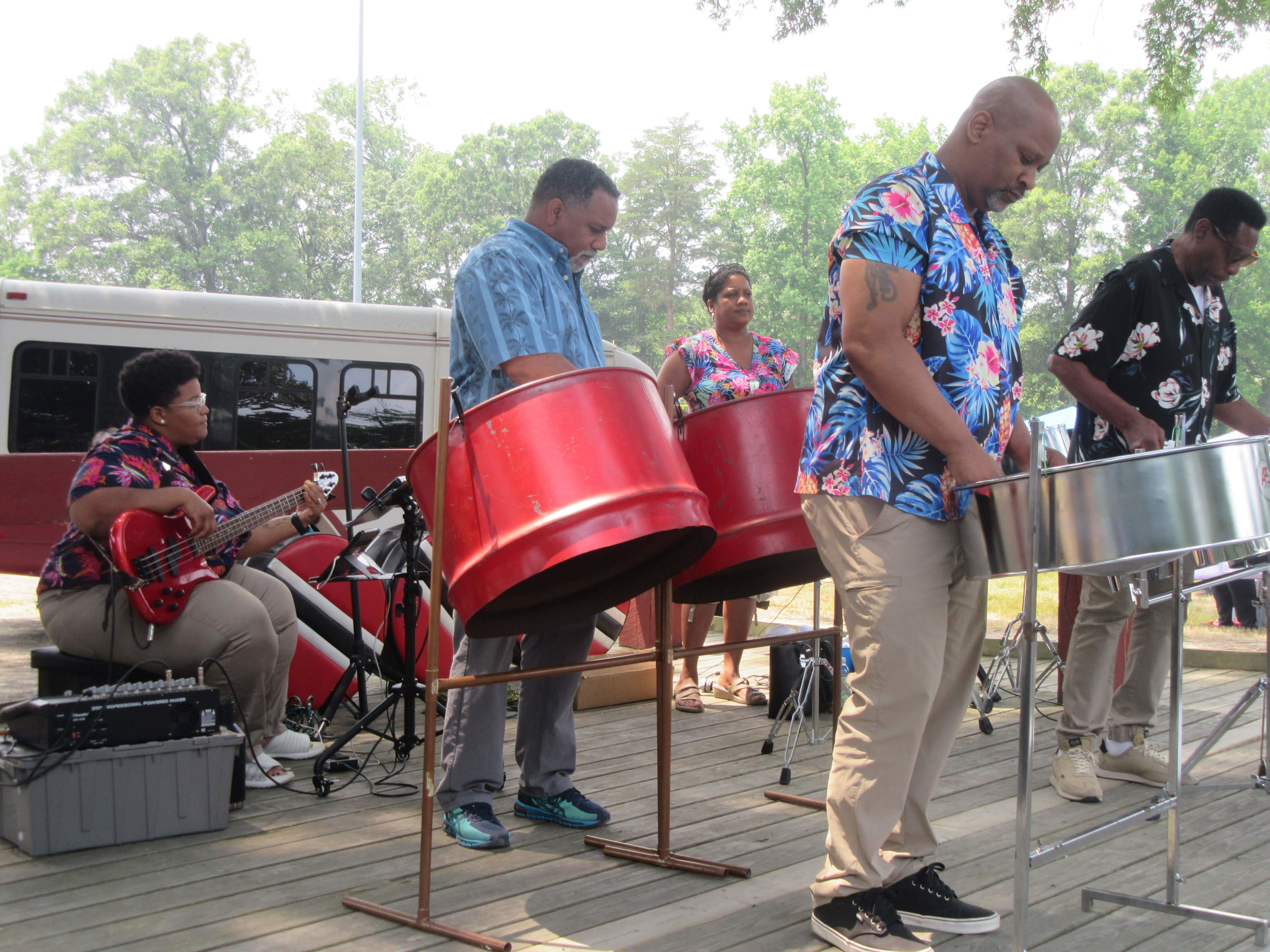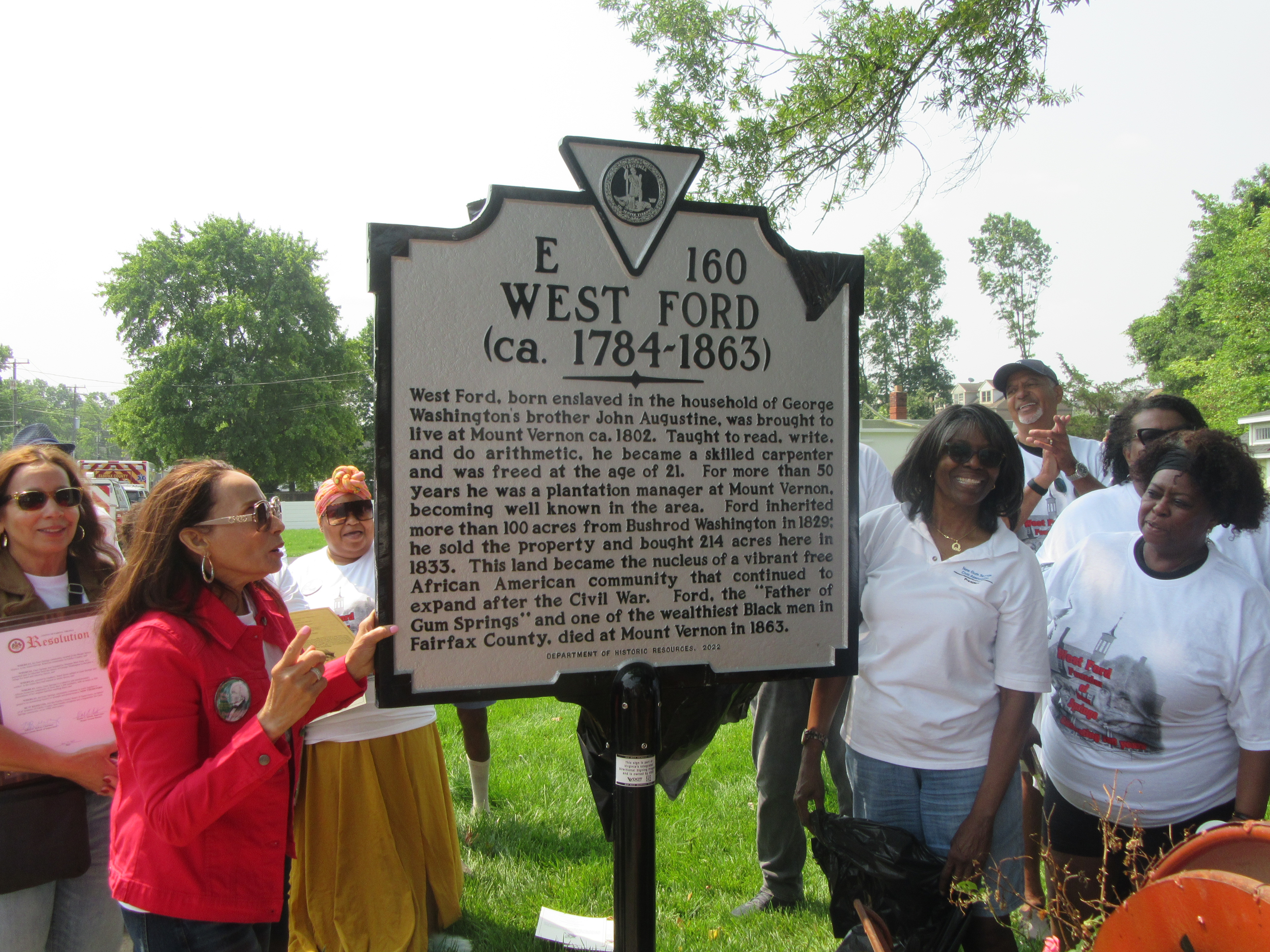Wednesday, June 21, 2023
“Gum Springs is here because of West Ford,” Virginia Delegate Paul Krizek asserted, “a community here long before subdivisions like Waynewood and Stratford Landing.”
“This is long overdue,” said Matt Briney, Vice President of Media and Communications at George Washington’s Mount Vernon, the plantation where the Washingtons enslaved West, the farm’s manager.

The C.A.I.S.O. steel band livened up the festivities.
Board of Supervisors Chair Jeff McKay noted that holding the event on Father’s Day weekend was a fitting time to honor the “Father of Gum Springs.” McKay stressed that people “should understand our entire history, … learn from it and do better.” He cited the renaming of Lee and Lee-Jackson Highways, roads named for two Confederate generals.
Mount Vernon Supervisor Dan Storck noted that Gum Springs is “the oldest African-American community in Fairfax County,” and is “a critical part of the county.” Reporting that County staff are now surveying the community’s historic resources, he remarked, “It’s not just buildings. We must talk to people to get the true history.”
McKay and Storck presented a resolution from the Board of Supervisors recognizing the anniversary and stating that “Gum Springs is a cohesive and predominantly African-American community of more than 2,500 residents, with as many as 500 descendants of the original families residing there.”
Virginia Department of Historic Resources official John Mullen commented that Virginia has 2,600 markers, that in the last five years, 60 percent have spotlighted African-American history.
After the unveiling, many attendees had a “descendants walk” from the marker to Martin Luther King Park Jr. Park for the Gum Springs Community Day-Juneteenth celebration. Fifty vendors offered healthy snacks, candy, health advice, beauty products, conservation flyers, voter registration materials, county services information, fraternity and sorority resources and more.
Queenie Cox, president of the New Gum Springs Civic Association, welcomed all and introduced Californian Linda Allen Hollis, a West Ford descendant and historian. Hollis, author of “I Cannot Tell a Lie,” a book that chronicles Ford’s descendants, told the crowd that Ford was the only child of George Washington, pointing out that Ford had blue-gray eyes and reddish hair. The Amazon summary of her book says, “Documented national history tells us that the nation’s first president had no children. But the oral history of the descendants of an African-American family tells a different story … [Washington] crossed the color line and deigned to establish an intimacy with a mulatto slave woman named Venus.” Encyclopedia Virginia says, “Ford’s paternity has proved controversial: some oral histories claim George Washington was West Ford’s father, though stronger evidence points toward Bushrod Washington.” Hollis provided a biography she wrote which states, “Future DNA analysis will be the determining factor of West Ford’s paternity.”
Two lines of vendors created a busy fairway.
Aimee Vosper and Ben Boxer with the Fairfax County Park Authority described plans for a trail connecting the park with Little Hunting Creek, saying that wetlands and cultural resources studies should be completed by late summer.
County transportation staffers gave updates on the proposed Richmond Highway (U.S. 1) bus rapid transit system. Local high school students are proposing artwork for the stations’ windscreens.
Kierystan Johnson with the Fairfax-Falls Church Community Services Board, a behavioral health specialist, provided wellness materials, free gun locks and advice. Mark Preston described the mediation services of the NVMS Conflict Resolution Center, a nonprofit that contracts with police departments in Fairfax, Arlington and Loudoun counties and Falls Church.
At a police recruiting vehicle, Dean Tran said that “policing gives people a sense of community and engagement.” While most trainees start as uniformed police officers, policing offers varied opportunities, like translators, detectives and helicopter pilots.
Gum Springs Youth Athletic Association representatives encouraged young people to join teams. The self-described “mad scientist” helped youngsters make slime, as many relished lollipops, ice cream and cotton candy. Others swirled around on the Fantastic Flyer. At some tables, children played games and did crafts.
Della J’s Restaurant lured a long line of patrons hungry for barbeque, baked beans, potato salad and peach cobbler. C.A.I.S.O. boosted already high spirits with lively steel drum music throughout the afternoon.
Ospreys on a nearby light pole seemed oblivious to the hoopla.
George Washington’s brother, John Augustine Washington and his wife, Hannah Bushrod Washington, enslaved Ford in Westmoreland County, Virginia. Hannah’s will directed that Ford be freed at age 21. When Hannah’s son, Bushrod, inherited Mount Vernon, he made Ford the manager and freed him around 1805. Bushrod bequeathed 119 acres to Ford in 1829. Ford sold the property and in 1833 purchased 214-acres, now the Gum Springs community.
Hollis told festival-goers that “Ford wanted a safe and secure place for newly-freed slaves, a place that was equitable and just.” Until the Civil War’s end, Gum Springs was a refuge for both runaway slaves and freed slaves.
The name Gum Springs comes from the sweet gum trees near the spring where George Washington watered his horses on the way to and from his Mount Vernon plantation, according to Ronald Chase, President of the Gum Springs Historical Society.
Ford’s legacy lives and the community is a symbol of “the struggles and resilience of African Americans,” Hollis said.
 Linda Allen Hollis and Queenie Cox unveiled the new West Ford highway marker.
Linda Allen Hollis and Queenie Cox unveiled the new West Ford highway marker.
Information